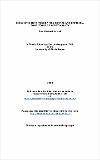Linguistic meta-theory the formal and empirical conditions of acceptability of linguistic theories and descriptions
Abstract
Most linguists acknowledge, explicitly or implicitly,
the relevance of epistemological questions in
linguistics but relatively few have given more than a
cursory, ad hoc or incomplete consideration to them.
The work of one of those few, Jan Mulder, forms the
starting point for much of the present discussion.
Epistemological considerations arise in many contexts
in linguistics and in many guises. It is an epistemological
matter whenever we test the adequacy of a
description or the acceptability of a theory. Epistemological
considerations are latent whenever we discuss
the form or the content of linguistic theories
and descriptions or their interrelations. The comparison
of different approaches to linguistics inevitably
raises epistemological questions concerning our
approach to linguistics or our presuppositions about it.
These questions are of a general nature and transcend
questions about particular linguistic theories and descriptions.
These epistemological questions force us to
consider what we take linguistics to be. In considering
questions of the type mentioned we are forced, for
example, to analyse what we mean by a "linguistic
theory", a "linguistic description" and what phenomena
we are aiming to understand. We are, furthermore,
forced to analyse the constraints which a scientific
attitude places upon linguistic theorising
and description-building. It is these questions concerning
the acceptability of linguistic theories and
descriptions which we call linguistic meta-theory.
This thesis falls into five main parts. Firstly,
in Chapter One, we consider the nature and scope of
linguistic meta-theory. Secondly, in Chapter Two, we
look at a number of previous approaches to the subject.
Other important contributions are discussed as they
arise in the text. Thirdly, in Chapters Three and
Four, we consider in detail the major meta-theoretical
distinctions in linguistics and their consequences.
In particular, we distinguish linguistic theories
from linguistic descriptions and discuss the nature of
linguistic phenomena. The view is put forward that
linguistics is a scientific subject. The meaning of
this assertion is analysed and the interrelations of
linguistic theories, descriptions and phenomena are
considered in the light of this analysis. The main
epistemological requirement that is put forward and
defended is that of the empiricism of linguistics.
Certain changes in our view of the philosophy of science
and in our view of the form of linguistic theories
and descriptions follow from the conjunction of
these major meta-theoretical positions.
Fourthly, we consider the main meta-theoretical
considerations concerning theories (Chapter Five) and
reject a widespread view of linguistic theory as a
non-empirical study (Chapter Six) and we consider the
main meta-theoretical conditions relating to linguistic
descriptions and some practical examples of description
-building consonant with the general positions adopted
in Chapter Seven. In Chapter Eight, we look at a concrete
example of theory-building in the light of the
meta-theoretical conditions of acceptability previously
set up. We are especially concerned to show how a
theory can meet the condition of being "applicable" or
"indirectly scientific" through the establishment of
acceptable empirical descriptions consonant with the
meta-theoretical conditions on descriptions considered
earlier.
The view that linguistics is a science implies
that we must be concerned with the empirical testing of
descriptions and, so, the fifth part of the work is
devoted to methodology. In Chapter Nine, we defend
the role and necessity of methodology in linguistics
and set up the logical framework of relations between
the methodology and theory descriptions and phenomena.
In Chapter Ten, we examine two of the known types of
empirical testing and their shortcomings. Finally, in
Chapter Eleven, we give an example of the successful
and correct application of a methodology in order to
bring out the nature of empirical testing and to demonstrate
its feasibility within a scientific linguistics
of the sort we imagine.
Type
Thesis, PhD Doctor of Philosophy
Collections
Items in the St Andrews Research Repository are protected by copyright, with all rights reserved, unless otherwise indicated.

